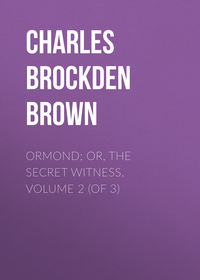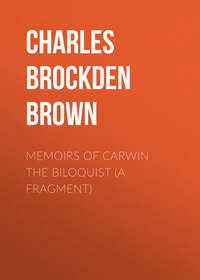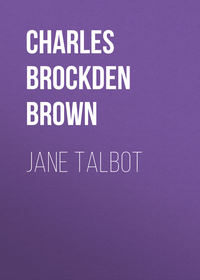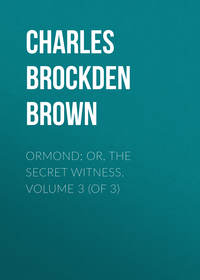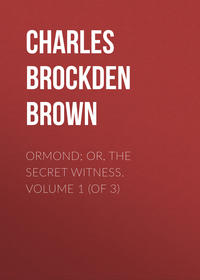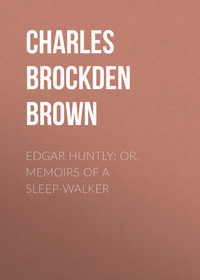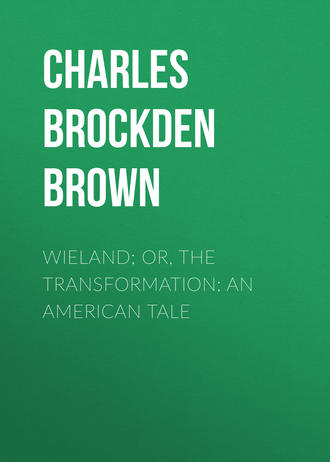 полная версия
полная версияWieland; Or, The Transformation: An American Tale
"What could I answer? My words were broken and inarticulate. Her fears naturally acquired force from the observation of these symptoms; but these fears were misplaced. The only inference she deduced from my conduct was, that some terrible mishap had befallen Clara.
"She wrung her hands, and exclaimed in an agony, "O tell me, where is she? What has become of her? Is she sick? Dead? Is she in her chamber? O let me go thither and know the worst!"
"This proposal set my thoughts once more in motion. Perhaps what my rebellious heart refused to perform here, I might obtain strength enough to execute elsewhere.
"Come then," said I, "let us go."
"I will, but not in the dark. We must first procure a light."
"Fly then and procure it; but I charge you, linger not. I will await for your return.
"While she was gone, I strode along the entry. The fellness of a gloomy hurricane but faintly resembled the discord that reigned in my mind. To omit this sacrifice must not be; yet my sinews had refused to perform it. No alternative was offered. To rebel against the mandate was impossible; but obedience would render me the executioner of my wife. My will was strong, but my limbs refused their office.
"She returned with a light; I led the way to the chamber; she looked round her; she lifted the curtain of the bed; she saw nothing.
"At length, she fixed inquiring eyes upon me. The light now enabled her to discover in my visage what darkness had hitherto concealed. Her cares were now transferred from my sister to myself, and she said in a tremulous voice, "Wieland! you are not well: What ails you? Can I do nothing for you?"
"That accents and looks so winning should disarm me of my resolution, was to be expected. My thoughts were thrown anew into anarchy. I spread my hand before my eyes that I might not see her, and answered only by groans. She took my other hand between her's, and pressing it to her heart, spoke with that voice which had ever swayed my will, and wafted away sorrow.
"My friend! my soul's friend! tell me thy cause of grief. Do I not merit to partake with thee in thy cares? Am I not thy wife?"
"This was too much. I broke from her embrace, and retired to a corner of the room. In this pause, courage was once more infused into me. I resolved to execute my duty. She followed me, and renewed her passionate entreaties to know the cause of my distress.
"I raised my head and regarded her with stedfast looks. I muttered something about death, and the injunctions of my duty. At these words she shrunk back, and looked at me with a new expression of anguish. After a pause, she clasped her hands, and exclaimed—
"O Wieland! Wieland! God grant that I am mistaken; but surely something is wrong. I see it: it is too plain: thou art undone—lost to me and to thyself." At the same time she gazed on my features with intensest anxiety, in hope that different symptoms would take place. I replied to her with vehemence—
"Undone! No; my duty is known, and I thank my God that my cowardice is now vanquished, and I have power to fulfil it. Catharine! I pity the weakness of thy nature: I pity thee, but must not spare. Thy life is claimed from my hands: thou must die!"
"Fear was now added to her grief. 'What mean you? Why talk you of death? Bethink yourself, Wieland: bethink yourself, and this fit will pass. O why came I hither! Why did you drag me hither?'
"I brought thee hither to fulfil a divine command. I am appointed thy destroyer, and destroy thee I must." Saying this I seized her wrists. She shrieked aloud, and endeavoured to free herself from my grasp; but her efforts were vain.
"Surely, surely Wieland, thou dost not mean it. Am I not thy wife? and wouldst thou kill me? Thou wilt not; and yet—I see—thou art Wieland no longer! A fury resistless and horrible possesses thee—Spare me—spare—help—help—"
"Till her breath was stopped she shrieked for help—for mercy. When she could speak no longer, her gestures, her looks appealed to my compassion. My accursed hand was irresolute and tremulous. I meant thy death to be sudden, thy struggles to be brief. Alas! my heart was infirm; my resolves mutable. Thrice I slackened my grasp, and life kept its hold, though in the midst of pangs. Her eye-balls started from their sockets. Grimness and distortion took place of all that used to bewitch me into transport, and subdue me into reverence.
"I was commissioned to kill thee, but not to torment thee with the foresight of thy death; not to multiply thy fears, and prolong thy agonies. Haggard, and pale, and lifeless, at length thou ceasedst to contend with thy destiny.
"This was a moment of triumph. Thus had I successfully subdued the stubbornness of human passions: the victim which had been demanded was given: the deed was done past recal.
"I lifted the corpse in my arms and laid it on the bed. I gazed upon it with delight. Such was the elation of my thoughts, that I even broke into laughter. I clapped my hands and exclaimed, 'It is done! My sacred duty is fulfilled! To that I have sacrificed, O my God! thy last and best gift, my wife!'
"For a while I thus soared above frailty. I imagined I had set myself forever beyond the reach of selfishness; but my imaginations were false. This rapture quickly subsided. I looked again at my wife. My joyous ebullitions vanished, and I asked myself who it was whom I saw? Methought it could not be Catharine. It could not be the woman who had lodged for years in my heart; who had slept, nightly, in my bosom; who had borne in her womb, who had fostered at her breast, the beings who called me father; whom I had watched with delight, and cherished with a fondness ever new and perpetually growing: it could not be the same.
"Where was her bloom! These deadly and blood-suffused orbs but ill resemble the azure and exstatic tenderness of her eyes. The lucid stream that meandered over that bosom, the glow of love that was wont to sit upon that cheek, are much unlike these livid stains and this hideous deformity. Alas! these were the traces of agony; the gripe of the assassin had been here!
"I will not dwell upon my lapse into desperate and outrageous sorrow. The breath of heaven that sustained me was withdrawn and I sunk into MERE MAN. I leaped from the floor: I dashed my head against the wall: I uttered screams of horror: I panted after torment and pain. Eternal fire, and the bickerings of hell, compared with what I felt, were music and a bed of roses.
"I thank my God that this degeneracy was transient, that he deigned once more to raise me aloft. I thought upon what I had done as a sacrifice to duty, and WAS CALM. My wife was dead; but I reflected, that though this source of human consolation was closed, yet others were still open. If the transports of an husband were no more, the feelings of a father had still scope for exercise. When remembrance of their mother should excite too keen a pang, I would look upon them, and BE COMFORTED.
"While I revolved these ideas, new warmth flowed in upon my heart—I was wrong. These feelings were the growth of selfishness. Of this I was not aware, and to dispel the mist that obscured my perceptions, a new effulgence and a new mandate were necessary.
"From these thoughts I was recalled by a ray that was shot into the room. A voice spake like that which I had before heard—'Thou hast done well; but all is not done—the sacrifice is incomplete—thy children must be offered—they must perish with their mother!—'"
Chapter XX
Will you wonder that I read no farther? Will you not rather be astonished that I read thus far? What power supported me through such a task I know not. Perhaps the doubt from which I could not disengage my mind, that the scene here depicted was a dream, contributed to my perseverance. In vain the solemn introduction of my uncle, his appeals to my fortitude, and allusions to something monstrous in the events he was about to disclose; in vain the distressful perplexity, the mysterious silence and ambiguous answers of my attendants, especially when the condition of my brother was the theme of my inquiries, were remembered. I recalled the interview with Wieland in my chamber, his preternatural tranquillity succeeded by bursts of passion and menacing actions. All these coincided with the tenor of this paper.
Catharine and her children, and Louisa were dead. The act that destroyed them was, in the highest degree, inhuman. It was worthy of savages trained to murder, and exulting in agonies.
Who was the performer of the deed? Wieland! My brother! The husband and the father! That man of gentle virtues and invincible benignity! placable and mild—an idolator of peace! Surely, said I, it is a dream. For many days have I been vexed with frenzy. Its dominion is still felt; but new forms are called up to diversify and augment my torments.
The paper dropped from my hand, and my eyes followed it. I shrunk back, as if to avoid some petrifying influence that approached me. My tongue was mute; all the functions of nature were at a stand, and I sunk upon the floor lifeless. The noise of my fall, as I afterwards heard, alarmed my uncle, who was in a lower apartment, and whose apprehensions had detained him. He hastened to my chamber, and administered the assistance which my condition required. When I opened my eyes I beheld him before me. His skill as a reasoner as well as a physician, was exerted to obviate the injurious effects of this disclosure; but he had wrongly estimated the strength of my body or of my mind. This new shock brought me once more to the brink of the grave, and my malady was much more difficult to subdue than at first.
I will not dwell upon the long train of dreary sensations, and the hideous confusion of my understanding. Time slowly restored its customary firmness to my frame, and order to my thoughts. The images impressed upon my mind by this fatal paper were somewhat effaced by my malady. They were obscure and disjointed like the parts of a dream. I was desirous of freeing my imagination from this chaos. For this end I questioned my uncle, who was my constant companion. He was intimidated by the issue of his first experiment, and took pains to elude or discourage my inquiry. My impetuosity some times compelled him to have resort to misrepresentations and untruths.
Time effected that end, perhaps, in a more beneficial manner. In the course of my meditations the recollections of the past gradually became more distinct. I revolved them, however, in silence, and being no longer accompanied with surprize, they did not exercise a death-dealing power. I had discontinued the perusal of the paper in the midst of the narrative; but what I read, combined with information elsewhere obtained, threw, perhaps, a sufficient light upon these detestable transactions; yet my curiosity was not inactive. I desired to peruse the remainder.
My eagerness to know the particulars of this tale was mingled and abated by my antipathy to the scene which would be disclosed. Hence I employed no means to effect my purpose. I desired knowledge, and, at the same time, shrunk back from receiving the boon.
One morning, being left alone, I rose from my bed, and went to a drawer where my finer clothing used to be kept. I opened it, and this fatal paper saluted my sight. I snatched it involuntarily, and withdrew to a chair. I debated, for a few minutes, whether I should open and read. Now that my fortitude was put to trial, it failed. I felt myself incapable of deliberately surveying a scene of so much horror. I was prompted to return it to its place, but this resolution gave way, and I determined to peruse some part of it. I turned over the leaves till I came near the conclusion. The narrative of the criminal was finished. The verdict of GUILTY reluctantly pronounced by the jury, and the accused interrogated why sentence of death should not pass. The answer was brief, solemn, and emphatical.
"No. I have nothing to say. My tale has been told. My motives have been truly stated. If my judges are unable to discern the purity of my intentions, or to credit the statement of them, which I have just made; if they see not that my deed was enjoined by heaven; that obedience was the test of perfect virtue, and the extinction of selfishness and error, they must pronounce me a murderer.
"They refuse to credit my tale; they impute my acts to the influence of daemons; they account me an example of the highest wickedness of which human nature is capable; they doom me to death and infamy. Have I power to escape this evil? If I have, be sure I will exert it. I will not accept evil at their hand, when I am entitled to good; I will suffer only when I cannot elude suffering.
"You say that I am guilty. Impious and rash! thus to usurp the prerogatives of your Maker! to set up your bounded views and halting reason, as the measure of truth!
"Thou, Omnipotent and Holy! Thou knowest that my actions were conformable to thy will. I know not what is crime; what actions are evil in their ultimate and comprehensive tendency or what are good. Thy knowledge, as thy power, is unlimited. I have taken thee for my guide, and cannot err. To the arms of thy protection, I entrust my safety. In the awards of thy justice, I confide for my recompense.
"Come death when it will, I am safe. Let calumny and abhorrence pursue me among men; I shall not be defrauded of my dues. The peace of virtue, and the glory of obedience, will be my portion hereafter."
Here ended the speaker. I withdrew my eyes from the page; but before I had time to reflect on what I had read, Mr. Cambridge entered the room. He quickly perceived how I had been employed, and betrayed some solicitude respecting the condition of my mind.
His fears, however, were superfluous. What I had read, threw me into a state not easily described. Anguish and fury, however, had no part in it. My faculties were chained up in wonder and awe. Just then, I was unable to speak. I looked at my friend with an air of inquisitiveness, and pointed at the roll. He comprehended my inquiry, and answered me with looks of gloomy acquiescence. After some time, my thoughts found their way to my lips.
Such then were the acts of my brother. Such were his words. For this he was condemned to die: To die upon the gallows! A fate, cruel and unmerited! And is it so? continued I, struggling for utterance, which this new idea made difficult; is he—dead!
"No. He is alive. There could be no doubt as to the cause of these excesses. They originated in sudden madness; but that madness continues. and he is condemned to perpetual imprisonment."
"Madness, say you? Are you sure? Were not these sights, and these sounds, really seen and heard?"
My uncle was surprized at my question. He looked at me with apparent inquietude. "Can you doubt," said he, "that these were illusions? Does heaven, think you, interfere for such ends?"
"O no; I think it not. Heaven cannot stimulate to such unheard-of outrage. The agent was not good, but evil."
"Nay, my dear girl," said my friend, "lay aside these fancies. Neither angel nor devil had any part in this affair."
"You misunderstand me," I answered; "I believe the agency to be external and real, but not supernatural."
"Indeed!" said he, in an accent of surprize. "Whom do you then suppose to be the agent?"
"I know not. All is wildering conjecture. I cannot forget Carwin. I cannot banish the suspicion that he was the setter of these snares. But how can we suppose it to be madness? Did insanity ever before assume this form?"
"Frequently. The illusion, in this case, was more dreadful in its consequences, than any that has come to my knowledge; but, I repeat that similar illusions are not rare. Did you never hear of an instance which occurred in your mother's family?"
"No. I beseech you relate it. My grandfather's death I have understood to have been extraordinary, but I know not in what respect. A brother, to whom he was much attached, died in his youth, and this, as I have heard, influenced, in some remarkable way, the fate of my grandfather; but I am unacquainted with particulars."
"On the death of that brother," resumed my friend, "my father was seized with dejection, which was found to flow from two sources. He not only grieved for the loss of a friend, but entertained the belief that his own death would be inevitably consequent on that of his brother. He waited from day to day in expectation of the stroke which he predicted was speedily to fall upon him. Gradually, however, he recovered his cheerfulness and confidence. He married, and performed his part in the world with spirit and activity. At the end of twenty-one years it happened that he spent the summer with his family at an house which he possessed on the sea coast in Cornwall. It was at no great distance from a cliff which overhung the ocean, and rose into the air to a great height. The summit was level and secure, and easily ascended on the land side. The company frequently repaired hither in clear weather, invited by its pure airs and extensive prospects. One evening in June my father, with his wife and some friends, chanced to be on this spot. Every one was happy, and my father's imagination seemed particularly alive to the grandeur of the scenery.
"Suddenly, however, his limbs trembled and his features betrayed alarm. He threw himself into the attitude of one listening. He gazed earnestly in a direction in which nothing was visible to his friends. This lasted for a minute; then turning to his companions, he told them that his brother had just delivered to him a summons, which must be instantly obeyed. He then took an hasty and solemn leave of each person, and, before their surprize would allow them to understand the scene, he rushed to the edge of the cliff, threw himself headlong, and was seen no more.
"In the course of my practice in the German army, many cases, equally remarkable, have occurred. Unquestionably the illusions were maniacal, though the vulgar thought otherwise. They are all reducible to one class, 2 and are not more difficult of explication and cure than most affections of our frame."
This opinion my uncle endeavoured, by various means, to impress upon me. I listened to his reasonings and illustrations with silent respect. My astonishment was great on finding proofs of an influence of which I had supposed there were no examples; but I was far from accounting for appearances in my uncle's manner. Ideas thronged into my mind which I was unable to disjoin or to regulate. I reflected that this madness, if madness it were, had affected Pleyel and myself as well as Wieland. Pleyel had heard a mysterious voice. I had seen and heard. A form had showed itself to me as well as to Wieland. The disclosure had been made in the same spot. The appearance was equally complete and equally prodigious in both instances. Whatever supposition I should adopt, had I not equal reason to tremble? What was my security against influences equally terrific and equally irresistable?
It would be vain to attempt to describe the state of mind which this idea produced. I wondered at the change which a moment had affected in my brother's condition. Now was I stupified with tenfold wonder in contemplating myself. Was I not likewise transformed from rational and human into a creature of nameless and fearful attributes? Was I not transported to the brink of the same abyss? Ere a new day should come, my hands might be embrued in blood, and my remaining life be consigned to a dungeon and chains.
With moral sensibility like mine, no wonder that this new dread was more insupportable than the anguish I had lately endured. Grief carries its own antidote along with it. When thought becomes merely a vehicle of pain, its progress must be stopped. Death is a cure which nature or ourselves must administer: To this cure I now looked forward with gloomy satisfaction.
My silence could not conceal from my uncle the state of my thoughts. He made unwearied efforts to divert my attention from views so pregnant with danger. His efforts, aided by time, were in some measure successful. Confidence in the strength of my resolution, and in the healthful state of my faculties, was once more revived. I was able to devote my thoughts to my brother's state, and the causes of this disasterous proceeding.
My opinions were the sport of eternal change. Some times I conceived the apparition to be more than human. I had no grounds on which to build a disbelief. I could not deny faith to the evidence of my religion; the testimony of men was loud and unanimous: both these concurred to persuade me that evil spirits existed, and that their energy was frequently exerted in the system of the world.
These ideas connected themselves with the image of Carwin. Where is the proof, said I, that daemons may not be subjected to the controul of men? This truth may be distorted and debased in the minds of the ignorant. The dogmas of the vulgar, with regard to this subject, are glaringly absurd; but though these may justly be neglected by the wise, we are scarcely justified in totally rejecting the possibility that men may obtain supernatural aid.
The dreams of superstition are worthy of contempt. Witchcraft, its instruments and miracles, the compact ratified by a bloody signature, the apparatus of sulpherous smells and thundering explosions, are monstrous and chimerical. These have no part in the scene over which the genius of Carwin presides. That conscious beings, dissimilar from human, but moral and voluntary agents as we are, some where exist, can scarcely be denied. That their aid may be employed to benign or malignant purposes, cannot be disproved.
Darkness rests upon the designs of this man. The extent of his power is unknown; but is there not evidence that it has been now exerted?
I recurred to my own experience. Here Carwin had actually appeared upon the stage; but this was in a human character. A voice and a form were discovered; but one was apparently exerted, and the other disclosed, not to befriend, but to counteract Carwin's designs. There were tokens of hostility, and not of alliance, between them. Carwin was the miscreant whose projects were resisted by a minister of heaven. How can this be reconciled to the stratagem which ruined my brother? There the agency was at once preternatural and malignant.
The recollection of this fact led my thoughts into a new channel. The malignity of that influence which governed my brother had hitherto been no subject of doubt. His wife and children were destroyed; they had expired in agony and fear; yet was it indisputably certain that their murderer was criminal? He was acquitted at the tribunal of his own conscience; his behaviour at his trial and since, was faithfully reported to me; appearances were uniform; not for a moment did he lay aside the majesty of virtue; he repelled all invectives by appealing to the deity, and to the tenor of his past life; surely there was truth in this appeal: none but a command from heaven could have swayed his will; and nothing but unerring proof of divine approbation could sustain his mind in its present elevation.
Chapter XXI
Such, for some time, was the course of my meditations. My weakness, and my aversion to be pointed at as an object of surprize or compassion, prevented me from going into public. I studiously avoided the visits of those who came to express their sympathy, or gratify their curiosity. My uncle was my principal companion. Nothing more powerfully tended to console me than his conversation.
With regard to Pleyel, my feelings seemed to have undergone a total revolution. It often happens that one passion supplants another. Late disasters had rent my heart, and now that the wound was in some degree closed, the love which I had cherished for this man seemed likewise to have vanished.
Hitherto, indeed, I had had no cause for despair. I was innocent of that offence which had estranged him from my presence. I might reasonably expect that my innocence would at some time be irresistably demonstrated, and his affection for me be revived with his esteem. Now my aversion to be thought culpable by him continued, but was unattended with the same impatience. I desired the removal of his suspicions, not for the sake of regaining his love, but because I delighted in the veneration of so excellent a man, and because he himself would derive pleasure from conviction of my integrity.
My uncle had early informed me that Pleyel and he had seen each other, since the return of the latter from Europe. Amidst the topics of their conversation, I discovered that Pleyel had carefully omitted the mention of those events which had drawn upon me so much abhorrence. I could not account for his silence on this subject. Perhaps time or some new discovery had altered or shaken his opinion. Perhaps he was unwilling, though I were guilty, to injure me in the opinion of my venerable kinsman. I understood that he had frequently visited me during my disease, had watched many successive nights by my bedside, and manifested the utmost anxiety on my account.


